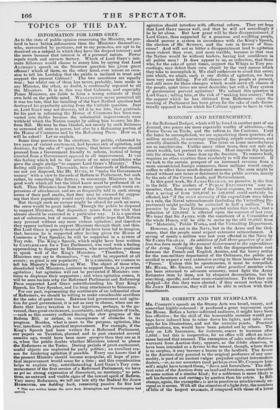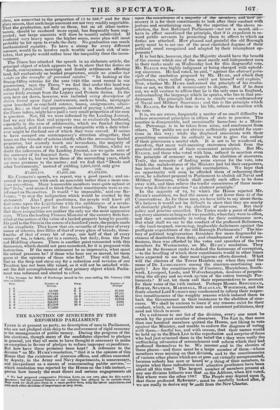MR. COBBETT AND THE STAMP-LAWS..
MR. CoBBETT's speech on the Stamp Acts was broad, massy, and somewhat highly-coloured : it produced a great impression upon the House. Before a better-informed audience, it might have been less effective ; for the skill of the honourable member would per- haps have induced him to sober down his lights, and take aver- ages for his illustrations, and not the extreme points. Practical qualifications, too, would have been pointed out by others. The duty on Life Insurance, for instance, ceases to increase after 5,0001.: but this is inoperative, for no office will effect an ink- ranee beyond that amount. The exemption of sales under distress- warrants from Auction-duty, appears, as the Gkbe, observes, to have been intended as a favour to the tenants though, where there is no surplus, it may become a bonus to the landlord. The favour in the Auction-duty granted to the original producers of any com- modity, is part of an ancient vulgar. prejudice against intermediate dealers,—or, as our ancestors (and perhaps even Mr. COBBETT him- self) might termed them, "Jews and forestallers." The diffe- rent rates of the Auction-duty on land and furniture, seem traceable to some notion of a similar kind; for a nobleman is more likely to sell his furniture and carriage by auction than his estate. In Bill- stamps, again, the exemptiosi is sot in practice so mischievously un- equal as it seems. With all the stimulus of alight duty, the numbers of bills Of the largest amounts, if compared, with those of a lower ever might be thefund out of which they were carved. It seems • to have escaped our contemporary's attention altogether, that taxes on the transfer of estates chiefly affect the necessitous landed Iproprietor, but scarcely touch our lawmaker_ ,s. the majority of whom either do not want to sell, or cannot. Neither, whilst we !.. doubt the inferences of the Leading Journal, are we quite sure of tile accuracy of its financial facts. We have not the returns of 1 S:28 to refer to, but we have those of the succeeding years, which are more germane to the matter; and we find that "Deeds and other Instruments," instead of yielding 2,056,358/. only give 1829. 1830. 1831.
X1,663;144. .£1,621,426. £1,512,105. 1 Mr. CODEETT'S speech, we repeat, was a good speech; and an- swered its purpose with such an assembly better than a more eau- ; Vous exposition. Many honourable members were quite aghast at tion—for they have paid for their knowledge. They also know ! that these inequalities are neither the only nor the most oppressive ones. When the leading Finance Minister of the country feels hor- ri fled at the notion of the value of a landed property being by possibi- lity paid to the State in the course of a huridred years, the people smile at his simplicity. They know that six-sevenths of the price of every ounce of tobacco, four-fifths of that of every glass of brandy, three- fourths of that of every bit of soap, one half of that of every ounce of tea, is taken, not in a century, but daily, from the Poor and Middlingb classes. There is another point connected with this discussion, which should not pass unnoticed, for it is pregnant with instruction. If the mere statement be so impressive, what must the actual pressure be? if those who hear are so moved, let them guess at the opinions of those who feel! They will then find, that as the deep and stern cry for a reduction and revision of our Taxation has not been idly raised, so it will not be satisfied with- out the full accomplishment of that primary object which Parlia- ment was reformed and elected to effect.
*The Stamps for Bills of Exchange issued in the year ending; 5th January 1832 were as follows.
Duty.
S. d. 1 0 1 6 9 0 2 6 3 6 4 6 5 0
Number of Stumps.
51,938
379,649
338,238 355,568
354,319 274,989
171,650 Duty. 8. d. 6 0 86 12 6 15 0 250 30 0
Number of Stumps.
87,890 65,195 36,182 12,652 3,845 1,413 the " facts," and seemd to think that their constituents were as un- informed as themselves. It would "be impossible," said one Re- former, "to stop the indignation which would be excited by the statement." Alas ! good gentleman, the people well knew all that came upon the Legislature with the suddenness of a revela- . upon leasehold or copyhold estates, leases, assignments, admis- sions, 4:c.; so that real property, instead of paying 1,800,0001., as the Times infers, might have paid a very small proportion of the sum in question. Nor, till we were informed by the Leading Journal, had we any idea that real property was so exclusively burdened, especially in the case of settlements, which we fancied (having, once, indeed, paid it ourselves) were chargeable with a duty what- class, are somewhat in the proportion of 13 to 300 ;* and fbr this plain reason, that such large amounts are not very readily negotiable. That the graduation, not only on these, but on all other instru- ments, should be rendered more equal, has frequently been sug- gested; but large amounts will then be usually subdivided. If rendered very heavy upon the higher sums, some plan will most probably be hit upon to evade the duty. No graduation can reach mathematical equality. To have a stamp for every different amount, would be to involve such trouble and such risk of mis- takes, that people would rather bear the inequality than the incon- Venience. The Times has attacked the speech in an elaborate article, the principal object of which appears to be to show that the duties on "deeds, conveyances, marriage and family settlements affecting land, fall exclusively on landed proprietors, while no similar tax exists on the transfer of personal estates." "In looking at the Stamp-Office returns for the year 1828 (the most recent in our possession)," says the Times," we find that under this head was collected. 2,056,3581." Real property, it is therefore implied, seems fairly exempt from the Legacy and Probate duties. In the sum here set down, however, was included every description of duties levied upon legal instruments, such as bonds, mortgages















 Previous page
Previous page